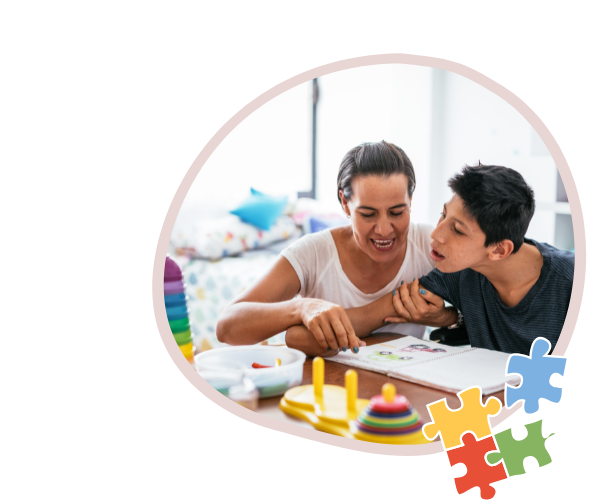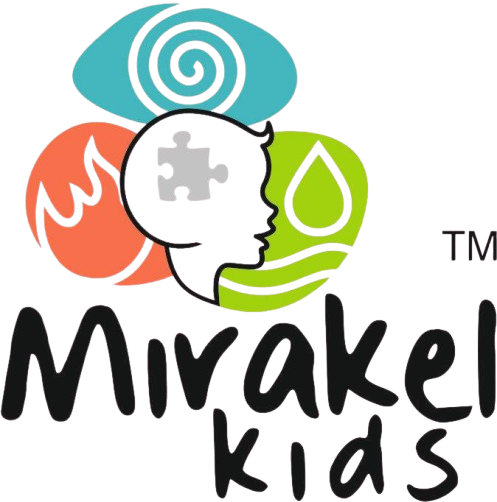Intellectual Disability

What is Intellectual Disability?
Intellectual Disability (ID), also known as Intellectual Developmental Disorder, refers to a condition characterised by limitations in both intellectual functioning and adaptive behaviour. These limitations can affect a person’s ability to learn, communicate, manage daily tasks, and interact socially. Intellectual disability can range from mild to profound, and its effects can vary from person to person. While treatment options typically include education and support services, Ayurveda offers a holistic approach to support individuals with intellectual disabilities by promoting balance within the body and mind.
Ayurvedic Perspective on Intellectual Disability
In Ayurveda, intellectual disabilities are often linked to an imbalance in the Vata dosha, which governs mental function, memory, and cognitive development. When Vata is disturbed, it can manifest as challenges with learning, speech, social skills, and behavioural regulation. Ayurvedic treatments aim to restore balance to the doshas, calm the nervous system, enhance cognitive function, and support emotional stability, thereby improving overall development and well-being.
Causes of Intellectual Disability:
Intellectual disability can be influenced by various factors, including:
-
1
Genetic factors:
Inherited conditions like Down’s syndrome or Fragile X syndrome can lead to intellectual disabilities.
-
2
Prenatal Factors:
Exposure to toxins, drugs, alcohol, or infections during pregnancy can increase the risk.
-
3
Birth Complications:
Premature birth, oxygen deprivation during birth, or birth defects may lead to developmental delays.
-
4
Infections and Brain Injuries:
Infections such as meningitis or physical trauma to the brain can disrupt cognitive development.
-
5
Nutritional Deficiencies:
Inadequate nutrition during early childhood can affect brain development.
-
6
Environmental Factors:
Exposure to pollutants, toxins, or inadequate stimulation can influence cognitive and emotional development.
Intellectual Disability Support Program at Mirakel Kids™
Book An Appointment
Know More About
- Condition We Treat
- Therapies
Intellectual Disability Treatment with Mạnӧ Saṃvardhāna Chikitsā™
A Holistic Ayurvedic Approach to Cognitive & Developmental Support
At Mirakel Kids™, we follow Mạnӧ Saṃvardhāna Chikitsā™, a specialised Ayurvedic therapy uniquely designed for children with Intellectual Disability (ID). Rooted in ancient wisdom, this approach nourishes, strengthens, and balances the mind and nervous system, helping children improve cognitive function, motor skills, speech development, and emotional stability.
Mạnӧ (मनः)
Mind, psychological well-being, cognitive functions
Saṃvardhāna (संवर्धन)
Nourishment, development, enhancement
Chikitsā (चिकित्सा)
Treatment, therapy
Thus, Mạnӧ Saṃvardhāna Chikitsā™ translates to “Holistic Mind Nourishing Therapy.” It is an Ayurvedic approach designed to enhance brain function, improve sensory processing, support learning abilities, and regulate emotional responses in children with mild to moderate intellectual disabilities.
Mạnӧ Saṃvardhāna Chikitsā™ is based on a structured 4-pillar protocol consisting of Bahya Chikitsa (External Therapy), Abhyantar Chikitsa (Internal Therapy), DEALS Framework, and Parental Support & Holistic Development to promote overall well-being.
Bahya Chikitsa (External Therapy)
Targeted Ayurvedic Therapies for Cognitive Stimulation & Neurological Support
Bahya Chikitsa consists of specialised Ayurvedic therapies that enhance brain function, improve sensory integration, and support neurodevelopment in children with Intellectual Disability.
Therapies Under Bahya Chikitsa
-
1
Abhyanga (Ayurvedic Oil Massage) –
Uses medicated oils like Brahmi Taila, Ksheerabala Taila, and Ashwagandha Taila to strengthen nervous system function, improve muscle coordination, and enhance sensory perception.
-
2
Shirodhara (Medicated Oil Dripping Therapy) –
A steady stream of warm herbal oil on the forehead stimulates brain activity, enhances neural connections, and improves concentration.
-
3
Nasya (Medicated Nasal Therapy) –
Herbal oils like Anu Taila and Brahmi Ghrita are administered nasally to boost neurotransmitter function, improve cognitive clarity, and support speech development.
-
4
Matra Vasti (Gentle Medicated Enema Therapy) –
A mild Vasti using Brahmi Taila & Ksheerabala Taila to detoxify the nervous system, balance Vata dosha, and support mental stability.
Benefits for Intellectual Disability
- Enhances cognitive function & learning capacity
- Improves motor skills & coordination
- Supports speech & language development
- Regulates emotional responses & social interaction
Abhyantar Chikitsa (Internal Therapy)
Brain-Nourishing Herbal Formulations to Support Neurodevelopment & Learning
Abhyantar Chikitsa focuses on internal Ayurvedic medicines and herbal formulations that stimulate cognitive function, support neuroplasticity, and improve memory & communication skills.
Key Herbs Used
-
1
Brahmi (Bacopa Monnieri) –
Improves cognitive processing, focus, and neural connectivity.
-
2
Shankhapushpi –
Supports memory retention, learning ability, and emotional regulation.
-
3
Vacha (Acorus calamus) –
Enhances speech clarity, verbal communication, and sensory perception.
-
4
Ashwagandha –
Reduces mental fatigue, anxiety, and emotional instability.
-
5
Guduchi & Mandukaparni –
Strengthen the nervous system and promote brain development.
Benefits for Intellectual Disability
- Improves cognitive function & mental alertness
- Enhances speech clarity & verbal communication
- Strengthens emotional resilience & learning ability
- Supports brain development & neurological growth
Duration: 1-3 years (based on severity)
A Structured Holistic Approach to Cognitive & Sensory Development
-
1
D – Diet Management –
A customised Ayurvedic diet rich in brain-boosting foods (ghee, walnuts, saffron, and Vata-balancing nutrients) to support neurotransmitter activity and neurodevelopment.
-
2
E – Exercise Management –
Gentle yoga postures, pranayama, and fine motor exercises to improve coordination, mobility, and sensory-motor integration.
-
3
A – Art of Sensory Integration Management –
Children with Intellectual Disability often experience challenges in auditory (hearing), visual (sight), and proprioceptive (body awareness) processing.
-
4
L – Lifestyle Management –
Structured daily routines, sleep regulation, and mindfulness practices to support cognitive adaptability and emotional balance.
-
5
S – Stress & Sleep Management –
Ayurvedic therapies like Shirodhara and Nasya, combined with relaxation techniques, to enhance sleep quality, emotional stability, and neural recovery.
How Sensory Integration Works for Intellectual Disability:
-
1
Hearing Sensitivity:
Difficulty in processing speech, following verbal instructions, or differentiating sounds. Ayurvedic therapies like Nasya, Brahmi-based oils, and sound therapy help improve auditory processing and communication skills.
-
2
Visual Sensitivity:
Trouble with visual tracking, spatial awareness, and eye-hand coordination. Herbal eye treatments, guided movement exercises, and Ayurvedic Rasayanas improve visual focus and cognitive responses.
Benefits for Intellectual Disability
- Improved Brain Function & Cognitive Support
- Enhanced Motor Skills & Stress Adaptation
- Better Sensory Integration & Reduced Overstimulation
- Balanced Lifestyle & Emotional Stability
Duration: Ongoing (with periodic adjustments)
Empowering Families with Ayurvedic & Behavioural Strategies for Neurodevelopment
A strong family support system is crucial for the development of children with Intellectual Disability. Our parental support program includes:
Key Strategies for Home-Based Support
-
1
Dinacharya (Daily Routine for Kids) –
Establishing a structured lifestyle, brain-boosting herbal tonics, and therapeutic activities.
- 2 Yoga & Pranayama for Sensory & Motor Development
- 3 Aromatherapy & Sound Therapy for Speech & Cognitive Enhancement
- 4 Mantra Chanting for Speech Development & Emotional Regulation
Benefits for Intellectual Disability
- Helps parents create a nurturing and structured home environment
- Supports speech therapy & cognitive development naturally
- Improves social interaction & emotional intelligence
- Encourages positive learning habits & sensory regulation
Duration: Ongoing (with periodic adjustments)
Why Choose Mạnӧ Saṃvardhāna Chikitsā™ for Intellectual Disability?
A Unique Ayurvedic Therapy Tailored for Neurodevelopmental Disorders
100% Natural & Safe Treatments
Customised Ayurvedic Therapies – External & Internal Therapies, DEALS Framework, & Sensory Integration
Clinically Proven to Enhance Cognitive Skills, Speech Development & Emotional Stability
FAQ
-
What is intellectual disability, and how can Ayurveda help?
Limitations in intellectual functioning and adaptive behavior are characteristics of intellectual disabilities. Ayurveda helps manage these challenges by improving focus, communication, and emotional regulation through natural, non-invasive treatments.
-
Is the treatment for intellectual disability at Mirakel Kids™ safe for my child?
Yes, all treatments are safe, natural, and non-invasive, designed to support your child’s well-being and promote cognitive and emotional development without harmful side effects.
-
How long does it take to see results?
While results vary, many children show improvements in focus, communication, and emotional regulation within a few weeks of treatment. Long-term results may take 1-3 years, depending on the severity of the condition.
-
Are these treatments painful?
No, all treatments are designed to be soothing, relaxing, and child-friendly, ensuring comfort throughout the process.
-
How do I get started?
Contact Mirakel Kids™ to schedule an initial consultation. We’ll assess your child’s needs and create a personalised treatment plan tailored to their unique developmental challenges.
Disclaimer: Ayurvedic treatments mentioned in this content may support overall wellness and can act as complementary therapies. However, for conditions like speech delay, these treatments should be used in conjunction with conventional medical interventions, such as speech therapy and behavioral treatments, under the guidance of healthcare professionals.
